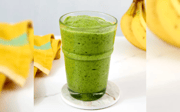This everyday food could help flush "forever chemicals" from your body, researchers say
By
Veronica E.
- Replies 0
Disclaimer: The information provided in this article is for educational purposes only and is not intended as a substitute for professional medical advice, diagnosis, or treatment. Always consult your physician or other qualified healthcare providers with any questions you may have regarding a medical condition or before making any changes to your health regimen.
If you’ve been hearing about “forever chemicals” and wondering what they mean for your health, you’re not alone.
These synthetic substances—officially called PFAS (per- and polyfluoroalkyl substances)—are found in everything from nonstick pans to food wrappers and have been building up in our bodies for decades.
But researchers may have found a simple, affordable way to help flush some of them out.
Dietary fiber—specifically a type called beta-glucan found in everyday foods may offer a natural way to help your body flush out toxins
For many older adults concerned about long-term toxin exposure, this news offers a glimmer of hope.

What are "forever chemicals"—and why do they matter?
PFAS are man-made chemicals that don’t easily break down, which is why they’ve earned the nickname “forever chemicals.”
They’re used in products designed to resist heat, oil, and water—think rain jackets, microwave popcorn bags, and even some cosmetics.
The downside? These chemicals have been linked to serious health risks including hormone disruption, cancer, fertility issues, immune problems, and developmental delays in children.
A recent report estimated that up to 100 million Americans may be drinking tap water that contains PFAS—making it hard to avoid them entirely, no matter how careful you are.
Also read: Discover the surprising food tip that could shield you from E. coli!
The power of fiber: A new study brings hope
The good news? A team from Boston University recently conducted a study that suggests certain fibers may help reduce PFAS levels in the body.
In the study, a group of men took beta-glucan fiber supplements three times a day for four weeks.
By the end, they showed an 8% drop in two common PFAS chemicals—PFOA and PFOS.
Why does this work?
When beta-glucan enters the gut, it forms a gel-like substance that binds to bile acids.
PFAS chemicals often cling to those acids—so when the fiber helps move them out of the body, it can also carry PFAS along for the ride.
Also read: Stop wasting money: Experts reveal the 5 supplements that won’t help your constipation!
Why this matters even more as we age
Older adults may be particularly vulnerable to the effects of PFAS.
Their immune systems naturally weaken with age, and we’ve had longer exposure to these chemicals over a lifetime.
Even small changes—like adding more fiber to your meals—could offer a gentle, protective boost.
Fiber does more than just clean house
Even without the PFAS angle, there are many reasons to up your fiber intake:
Yet most Americans fall short.
Nine out of ten people don’t get enough fiber, with the average intake far below the recommended 22–34 grams a day.
Also read: Are beans the best for your health? Why nutritionists think you’re missing out.
Easy ways to get more fiber
Adding fiber doesn’t have to mean overhauling your diet. Try starting with:
If you’re having trouble getting enough through food, talk to your doctor about beta-glucan supplements. They may be a helpful addition.

Also read: Experts reveal 5 foods you should be eating every day for better health
A word of caution: fiber isn’t a cure-all
While this study is promising, it focused on a specific type of fiber, and more research is needed to know if other fibers work the same way—or if results last beyond a few weeks.
PFAS can stay in the body for years, so this isn’t a magic fix.
But it’s a positive step in the right direction!
Other ways to reduce PFAS exposure
Here are a few more strategies you can try:
At The GrayVine, we believe knowledge is power—especially when it comes to protecting your health as you age.
Let’s keep the conversation going and help each other stay informed, strong, and supported!
Read next: Is your breakfast drink raising your risk of diabetes? New research suggests it might

Have you made any changes to your routine to avoid PFAS? Are you thinking about adding more fiber to your diet—or already seeing benefits? Share your thoughts, questions, or tips in the comments. We’d love to hear from you!
If you’ve been hearing about “forever chemicals” and wondering what they mean for your health, you’re not alone.
These synthetic substances—officially called PFAS (per- and polyfluoroalkyl substances)—are found in everything from nonstick pans to food wrappers and have been building up in our bodies for decades.
But researchers may have found a simple, affordable way to help flush some of them out.
Dietary fiber—specifically a type called beta-glucan found in everyday foods may offer a natural way to help your body flush out toxins
For many older adults concerned about long-term toxin exposure, this news offers a glimmer of hope.

Researchers continue to study how everyday foods might help reduce the effects of environmental toxins like PFAS. Image Source: Pexels / Edward Jenner.
What are "forever chemicals"—and why do they matter?
PFAS are man-made chemicals that don’t easily break down, which is why they’ve earned the nickname “forever chemicals.”
They’re used in products designed to resist heat, oil, and water—think rain jackets, microwave popcorn bags, and even some cosmetics.
The downside? These chemicals have been linked to serious health risks including hormone disruption, cancer, fertility issues, immune problems, and developmental delays in children.
A recent report estimated that up to 100 million Americans may be drinking tap water that contains PFAS—making it hard to avoid them entirely, no matter how careful you are.
Also read: Discover the surprising food tip that could shield you from E. coli!
The power of fiber: A new study brings hope
The good news? A team from Boston University recently conducted a study that suggests certain fibers may help reduce PFAS levels in the body.
In the study, a group of men took beta-glucan fiber supplements three times a day for four weeks.
By the end, they showed an 8% drop in two common PFAS chemicals—PFOA and PFOS.
Why does this work?
When beta-glucan enters the gut, it forms a gel-like substance that binds to bile acids.
PFAS chemicals often cling to those acids—so when the fiber helps move them out of the body, it can also carry PFAS along for the ride.
Also read: Stop wasting money: Experts reveal the 5 supplements that won’t help your constipation!
Why this matters even more as we age
Older adults may be particularly vulnerable to the effects of PFAS.
Their immune systems naturally weaken with age, and we’ve had longer exposure to these chemicals over a lifetime.
Even small changes—like adding more fiber to your meals—could offer a gentle, protective boost.
Fiber does more than just clean house
Even without the PFAS angle, there are many reasons to up your fiber intake:
- Better digestion: Helps with regularity and reduces the risk of colon cancer.
- Heart health: Soluble fiber can lower cholesterol and help regulate blood pressure.
- Blood sugar balance: Helps keep blood sugar levels steady.
- Fullness and weight control: Fiber-rich foods are more filling, making overeating less likely.
Yet most Americans fall short.
Nine out of ten people don’t get enough fiber, with the average intake far below the recommended 22–34 grams a day.
Also read: Are beans the best for your health? Why nutritionists think you’re missing out.
Easy ways to get more fiber
Adding fiber doesn’t have to mean overhauling your diet. Try starting with:
- A bowl of oatmeal for breakfast (with berries for an extra boost)
- Mushrooms in salads or stir-fries
- Snacks with chia or flax seeds
- Swapping white bread for whole grains
- More veggies at lunch and dinner
If you’re having trouble getting enough through food, talk to your doctor about beta-glucan supplements. They may be a helpful addition.

A bowl of oatmeal topped with berries offers a delicious, fiber-rich start to the day—especially helpful for flushing out harmful PFAS. Image Source: YouTube / Polina Tankilevitch.
Also read: Experts reveal 5 foods you should be eating every day for better health
A word of caution: fiber isn’t a cure-all
While this study is promising, it focused on a specific type of fiber, and more research is needed to know if other fibers work the same way—or if results last beyond a few weeks.
PFAS can stay in the body for years, so this isn’t a magic fix.
But it’s a positive step in the right direction!
Other ways to reduce PFAS exposure
Here are a few more strategies you can try:
- Use a water filter certified to remove PFAS
- Cook with cast iron or stainless steel instead of nonstick pans
- Avoid fast food packaging when possible
- Look for PFAS-free labels on waterproof or stain-resistant items
At The GrayVine, we believe knowledge is power—especially when it comes to protecting your health as you age.
Let’s keep the conversation going and help each other stay informed, strong, and supported!
Read next: Is your breakfast drink raising your risk of diabetes? New research suggests it might
Key Takeaways
- A Boston University study found that beta-glucan fiber—found in oats, mushrooms, and some seeds—may help reduce PFAS levels in the body.
- Participants who took beta-glucan supplements three times a day saw an 8% drop in two harmful PFAS types: PFOA and PFOS.
- Beta-glucan binds to bile in the gut, which PFAS attach to—helping the body flush them out through digestion.
- Most Americans don’t get enough fiber, missing out on its benefits for digestion, heart health, and potentially even toxin removal.
Have you made any changes to your routine to avoid PFAS? Are you thinking about adding more fiber to your diet—or already seeing benefits? Share your thoughts, questions, or tips in the comments. We’d love to hear from you!






